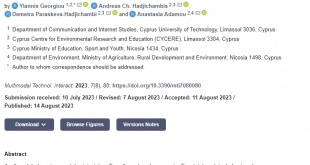A systematic literature review of K-12 environmental Citizen Science (CS) initiatives: Unveiling the CS pedagogical and participatory aspects contributing to students’ environmental citizenship.
Hadjichambi D., Hadjichambis A. Ch., Adamou A. & Georgiou Y. (2023). Educational Research Volume 39,2023, 100525. ( Q1, H index: 78)
Abstract:
Environmental Citizen Science (CS) initiatives have been largely embraced in K-12 education, as they are often hypothesized to improve students’ knowledge, skills, attitudes, and behaviours to act as “environmental citizens” according to the notion of Environmental Citizenship (EC). However, the potential of environmental CS initiatives to promote Education for Environmental Citizenship (EEC) has not been systematically explored. At the same time, environmental CS initiatives for educational purposes are highly heterogenous and learning is enacted in diverse ways, according to the participatory and the pedagogical components underpinning each initiative. To address the complexity of the field, this review study adopts the PRISMA methodology to synthesize thirty-four empirical studies (n = 34) retrieved from a systematic review of the literature covering the last two decades (2000–2020). The reviewed environmental CS initiatives were subjected to a content analysis to identify their impact on students’ EC (e.g., EC competences, actions, outcomes), as well as to unveil the CS initiatives’ constitutional components in terms of (a) Participation (e.g., types of students’ contributions, level of data collection, frequency of students’ participation, modes of student engagement, forms of students’ involvement), and (b) Pedagogy (e.g., learning goals, educational contexts, learning mechanisms, EEC pedagogy). Our analysis shed light to the three territories (Participation, Pedagogy, Environmental Citizenship) underpinning the reviewed CS initiatives as well as to their interrelations. We reflect on these findings, and we provide directions for future research to guide the development of more successful environmental CS initiatives in K-12 education, serving as a vehicle for EC.
Read more here
 Κυπριακό Κέντρο Περιβαλλοντικής Έρευνας & Εκπαίδευσης – Κυκπεε
Κυπριακό Κέντρο Περιβαλλοντικής Έρευνας & Εκπαίδευσης – Κυκπεε







